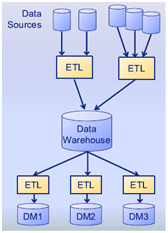The source of data for an organization are many, hence it leads to data disparity. Data Consolidation helps to remove the disparity by migrating, transforming and synchronizing the data. Data Consolidation plays a critical role in transforming Data into Information and Knowledge and thus improves data Utility.
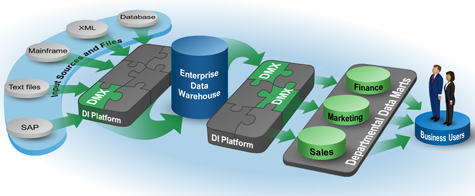
Our expertise in DIKU services for Business Enterprises enable us to be your Data Consolidation partner.
DiKube Benefit:
- Our consultants have successfully implemented many mission critical Data Integration Services, Data Warehouse and Master Data Management solutions along with BPM, Business Intelligence, Business Analytics and Decision Support systems to give organizations the competitive advantage.
- Through Our in-house training & placement services we ensure supply of quality consultants for your large project implementations.
- Our Business and functional Knowledge in your domain allows us to shorten your project implementation time and ensure data quality, thus improves success rate of Data Integration implementation.
Data integration (DI) is a process of gathering data from heterogeneous data sources, combining and presenting a unified view of these data to the user, either under a single query interface called Mediator view (AKA Loosely Coupled DI) or as a centralized data repository known as Data Warehouse (AKA Tightly Coupled DI), for user's analytical purpose. We offer following Data Integration services:
- Loosely coupled DI
- Tightly coupled DI
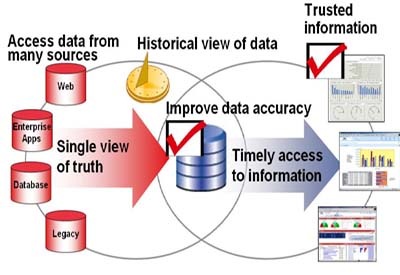 In this "view-based query-answering" process each of the data sources functions as a view over the (nonexistent) mediated schema. When a user queries the mediated schema, the query is transformed into appropriate queries over the respective data sources. Finally, the virtual database combines the results of these queries into the answer to the user's query. Thus it offers virtual data view by integrating data at Logical Data Layer, hence enables Real Time Data Access.
In this "view-based query-answering" process each of the data sources functions as a view over the (nonexistent) mediated schema. When a user queries the mediated schema, the query is transformed into appropriate queries over the respective data sources. Finally, the virtual database combines the results of these queries into the answer to the user's query. Thus it offers virtual data view by integrating data at Logical Data Layer, hence enables Real Time Data Access.
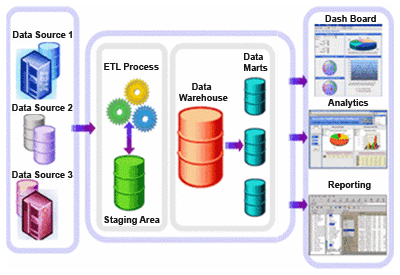 Data reside together in a single DWH repository at query-time. It uses ETL tool to Extract data from chosen sources, Transform data into new formats according to business rules, and then Load it into target DWH data structures. Thus it offers stored data in tables by integrating data at Physical Data Layer. Hence DWH enables access to Latent Data, but not to the Real Time Data, which otherwise would need re-execution of ETL process to ensure freshness of data in DWH.
Data reside together in a single DWH repository at query-time. It uses ETL tool to Extract data from chosen sources, Transform data into new formats according to business rules, and then Load it into target DWH data structures. Thus it offers stored data in tables by integrating data at Physical Data Layer. Hence DWH enables access to Latent Data, but not to the Real Time Data, which otherwise would need re-execution of ETL process to ensure freshness of data in DWH.
DiKube Benefit:
-
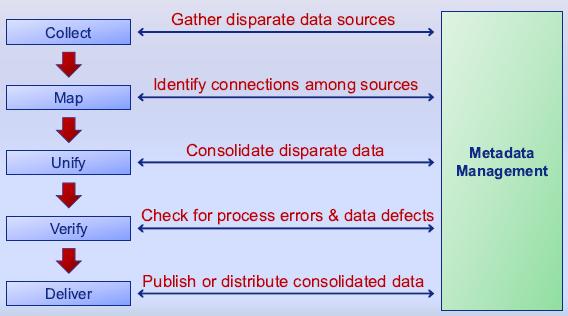
- Our consultants can analyze your requirements, make recommendations and construct either form of DI models to suit your business objectives.
- Pulling together and reconciling dispersed data from heterogeneous systems involves a need to access, catalog, profile, map, model, extract, move, unify, consolidate, transform, standardize, cleanse, load and validate these data and make it available to the user. We perform all these tasks efficiently and effectively.
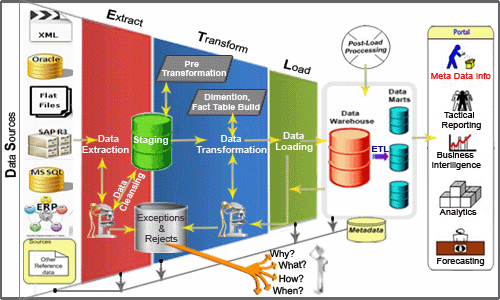
Data Warehousing encompasses the processes, techniques and tools that are used to design, build, integrate, deploy, maintain and sustain the DWH and downstream Data marts, and the mechanism to deliver data to the end users.
Data Mart (DM) is a physical, repository of integrated, non volatile, time variant collection of data organized to meet the needs of a specific work group (AKA a subject area). Data Warehouse (DWH) is a physical, repository of subject oriented, integrated, non-volatile, time variant collection of data organized to support management's Decision Making needs. Hence a DWH is the union of all constituent Data Marts (in a Bus Model).
DiKube Benefit: Our consultants are proficient in both Bus Model, and Hub & Spoke model of DWH. Our services in Data Warhousing include:
- Help provide one source of the truth of the combined data for BI/ Analytics ie One stop, single version data source, thus increasing the confidence in the data for decision making.
- Perform trend analysis and research business history for each subject area using the time variant nature of data. And provide stability and reliability of business decisions using the Non volatile nature of data.
- Enable easy adaptability and usability by utilizing the subject oriented data in business context.
- Set the stage for building the EDWH, downstream Data Marts and Enterprise Information Integration (EII) and hence provide powerful, timely, essential Analytics/BI solutions/Decision making systems.
- We can set up the DWH Eco systems including Data Integration, Metadata Management, Data Access and Process management sub systems
- Enable Data Warehousing effectively and efficiently at low cost.
